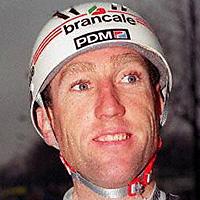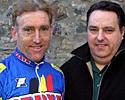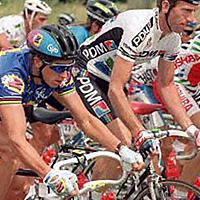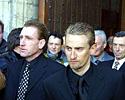
Recently on Cyclingnews.com |
92nd Tour de France - July 2-24, 2005
An interview with Sean Kelly, July 4, 2005
King Kelly speaks Part II
In Part I Sean Kelly spoke about the current Tour riders and the way he saw things panning out this July. In the conclusion to Shane Stoke's interview, Kelly discusses his own career, his views on the status quo of pro cycling today and compares his memories of racing to the current situation.
CN: Have you any regrets in your career?

|
SK: Well, there are always regrets. That said, when you go through disappointments you gain experience; so even if you were able to go back and change things, perhaps the overall picture would turn out differently, not as good.
But there are changes you might make. I used to take part in a huge number of races in the early part of the season. If I was to do it again I think I would probably cut down on those and have a better go at the Tour de France. I would arrive at it a bit fresher, not go there with too much racing under my belt.
All that said, there was a reason. I raced with Spanish teams quite a bit. When I was racing with Kas and also racing for Skil, they were interested in the Spanish racing programme and so I had to ride those.
CN: I guess the salaries were smaller back then, too, making race winnings more important...
SK: Yes, there was less money. That was certainly a factor.
I wanted to do the Classic races because I knew I could win some of them. I could win more than one in some years. With Kas and the other Spanish sponsors, they said that they would put a team into those races to support me, but that the Belgian classics or Paris-Roubaix didn't really interest them. They said that they were not going to sell many soft drinks in that climate! So the Spanish races were very important to them, events such as the Tour de Pays-Basque, the Tour of Catalonia and the Tour of Spain.
I was caught between having to do that Spanish programme because of the sponsor, while wanting to do the classics myself. That meant that the beginning of the season was very heavy.
CN: If I remember correctly, you finished second in the Tour of Flanders, went straight to the Tour de Pays Basque and won there, then on to Paris-Roubaix where you also came out best. That's pretty intense...
SK: Yes, but I did that programme quite a number of years. I would do the Tour of Flanders, leave that evening for the Pays Basque and then come back for Roubaix. That was usual.
CN: You were second three times in the Tour of Flanders. It is the one which just got away...
SK: Yes, I did. I performed well in it but made some mistakes. The year that Van Der Poel beat me (1986), that was the year that I had the winning of it. But I was so good and felt so strong, I just carried everyone to the finish. In the sprint I said I would lead it out, because I was too bloody sure! That is when you lose races. I have heard riders say that before, that when you are really riding well and you are on a super day, that is time you lose races. You think that nobody is going to beat you and you get too headstrong. That's what happened in the Tour of Flanders that year, making the opportunity for Van der Poel to beat me.
There were other years where I missed out, too. When Lammerts won it in 1984, I was in that group and was the big favourite. I hit them on the Muur and pulled away a group, riding for a long time on the front. The other riders did small bits of riding with me, but then when we got to the last ten kilometres they all started to attack me, one by one. I tried to play the card of letting one guy get away to see if the others would do some chasing, but when he got away everyone else just looked at me.
That was a regret afterwards, because I was capable of going after everyone immediately and not letting anyone away.
"I think, taking everything into consideration, doing it the way Armstrong does is a good way."-Kelly can't find fault in Lance Armstrong's approach to the Tour de France |
CN: Towards the end of your career, the time came when people were starting to specialise in races such as the Tour. LeMond, for example, was doing it. You suggested you could have concentrated more on the race by reducing other parts of your programme. So do you think you could you have won a Tour, if you had done a build-up like Armstrong's?
SK: I definitely think a podium place was possible. I don't know if I would have been capable of winning one - that is something I'll never know. But I definitely would have come into it much fresher. So that is something I would have done - changed the programme at the beginning of the year.
CN: The ProTour is trying to put an emphasis back on the way things used to be, where the calendar is balanced out a little and when races other than the Tour become a bit more important...
SK: I don't think it is going to make a huge difference with the big riders. Look at Armstrong - he is not going to do any more than what he has done for the past few years. So too Ullrich - he doesn't have to do it. The ProTour doesn't oblige the riders to take part in certain races, just the teams. The UCI were trying to bring in a rule where so many of a team's top riders have to take part, but as far as I know that regulation didn't go through. The teams just have to put in a squad, that is all they are obliged to do.
All that means is that teams have to be big enough to field riders in different events. As a result, it costs more for a team because sometimes there is an overlap such as with Paris-Nice and Tirreno-Adriatico. You have to two teams, two lots of mechanics and other workers, vehicles, etcetera. It has made the budgets bigger.
CN: Do you think it is a positive step for cycling, then?

|
SK: Yes, it is a good step. But I think the UCI were a bit heavy on it, trying to get everyone to agree to their terms immediately. They thought the big Tours would just go along with it, accepting the limitations on the wildcards and that. But I think the organisers were 100 percent right to have these wildcards because they need them in the Tour of France, Tour of Spain and Tour of Italy. You could get a sponsor down in Spain who comes in as a smaller one for the first two or three years but then wants to increase his investment. He could be a sponsor with a ProTour budget, but if you don't have the wildcards you can lose those people very easily. I think the UCI didn't think in that way.
CN: Is there then an argument for reducing teams to eight riders in Grand Tours? One, that will enable more wildcard teams to come in as it will keep the field to the same size, and secondly it will make races harder to control by any one team and therefore more exciting...
SK: Yes, but for the teams with the riders to win the race, it makes things very difficult for them. With nine it's a lot of work for a team to control it. As things stand, you might have a really strong team who can adequately support a leader who is capable of winning the Tour. But not all squads are at the same level.
Say you take Euskaltel, for example. Imagine Mayo has a good opening week and then blitzes everyone in the early mountains. He could be leading by a couple of minutes, but he needs to have a team around him, otherwise he will have to do a lot of work himself towards the end of these mountain stages. If you drop a rider from each team, it really limits it a lot for those guys.
CN: Would that be a bad thing? Would it not make racing more exciting if the lead changes often?
SK: I think it is unfair, really. You will get these four or five guys who are capable of winning the Tour, but if you take teams down to eight it makes it really difficult for them. Okay, on the other side of things it does make the race more interesting because there are breaks getting away and more action in it, but still for those who are trying to win the Tour their teams have to do an awful lot of work. They have to work very hard for it and I don't think it would be fair to reduce it again. There would be uproar from the teams...
CN: What do you think will happen between the UCI and the Grand Tour organisers? Will they come to an agreement, or do you see it going the other way?
SK: I think they will come to a compromise, long term. I think they will sort it all out.
CN: Armstrong took a sixth Tour last year. As a rider who is the opposite to the way you were, in terms of peaking for that event to the exclusion of others, what is your opinion of what he has achieved?

|
SK: We have two different careers, altogether. There is a totally different outlook now than when I was racing. You have the Classics riders and the Tour riders. The one-day guys now do the Classics and then don't concentrate on anything else for a while. They are out and then they come back at the end of the year. As for the Tour riders, they prepare for the Tour. As you said earlier, it all started with LeMond. It is a new way of doing it.
It is great when you are like Armstrong, when you win the Tour. Unfortunately the spectators don't get very many occasions when they see Armstrong, and so that is a pity.
I think, taking everything into consideration, doing it the way Armstrong does is a good way. It suits him, the sponsors are very happy and so why not do it that way? Certainly, if I was going back again I would approach it like that.
CN: Do you think riders like Armstrong and Merckx can be compared, then? There were some suggestions after last year's Tour that Armstrong was a better rider because he has taken six, but that to me is not a fair argument...
SK: No, you can't compare. Times are different. With the salaries they have now, they don't have to do half as much. I have heard Merckx say that when he was competing, he had to the criteriums and the six days because that was all part of him making his money. When you have to do that, you can't compare Merckx's career with Armstrong's. He was doing a huge amount of races throughout the year, a really, really heavy programme.
CN: There was talk earlier this year that Armstrong might concentrate on other races rather than the Tour. What would you have done in his position?
SK: The Tour, definitely. There is no way that I would change from the routine that he has been doing. Also, there is no way that he should have gone for a Tour of Italy rather than the Tour de France. Looking at the way he and the team got through the Tour last year, if he and they can get close to that form again this year, then there is definitely another Tour there for them.
CN: What is the biggest challenge for a champion towards the end of his career?
"When I got out of it, I didn't have any regrets."-Kelly knew when the time was right to retire, so he did |
SK: The big test is keeping your focus. I certainly started losing it before I retired. One side of me wanted to continue, to compete, but the other side of me meant that I wasn't able to do it when I went training. I would go out with the idea of doing five hours but I seemed to be back after two and a half. I didn't have the motivation that I had in the winter time as well. When you lose it in the winter time, when you start taking shortcuts and not going out because the weather is bad, your level starts dropping quite quickly.
CN: Did you find it hard to adapt to normal living once you stopped?
SK: No, I felt a lot of freedom. I did my last year because Catavana was a small team and Gallopin was there. They had a lot of young riders. They asked me to do that season to help out, so I did it because of that. That year was a difficult one because already, the previous year, I had problems. I wasn't motivated to train at all that winter and I was having major difficulties during the season. But I enjoyed the team a lot in my last year, outside the races. In the races itself I found it very difficult because I was getting a hard time. I hadn't prepared right and mentally I was fifty percent gone, maybe.
When I got out of it, I didn't have any regrets. But it is difficult as your body is used to doing so much, every day riding the bike. There are times when you feel like punching down the doors. You still have a lot of energy in you, building up. That venom builds up inside you and you are not burning it off as you would be during races. I was still doing sixty mile rides three times a week, but that is only a fraction of what I used to be doing.
CN: You look in good shape. A lot of ex-pros go to pieces after they retire but you haven't. Do you do much nowadays?

|
SK: In the winter time I do a lot because travel-wise, I am pretty free at that time. I don't have a busy schedule and so I get a lot done with the locals. Guys like Ciarán Power (Navigators Insurance professional) come out with us. We have quite a big gang of guys from the area who would be winning Irish races, so it is a good group. We do some good miles, but when I start working on Paris-Nice and the Classics, there are maybe five or six weeks when I don't do anything. Then the shape starts shooting down again. You have to try to get it all back again after.
But I don't carry a lot of weight. I still look pretty fit. I am a little careful with my food, and also the good winter helps.
CN: You do a lot of work commentating for Eurosport. Do you enjoy being part of the racing scene?
SK: Yeah, I do. I do. It is good because you see a lot of riders that I competed with. They are involved in team management or, during the Tour de France, they work with other TV stations or radio stations. You meet an awful lot of people so it is enjoyable.
CN: And outside the commentary, what do you do?
SK: I don't do a lot back home. I have a farm but I don't work on that. I rent it out so day to day, there isn't a lot to do. I try to make some investments and buy some property. I do a bit of that with some other people I know.
CN: I believe you keep a few donkeys?
SK: Yes, that is the small bit of farming I do. I have donkeys and some horses. But that wouldn't be time consuming. I don't put a lot of effort into that - it is very little work, really.
